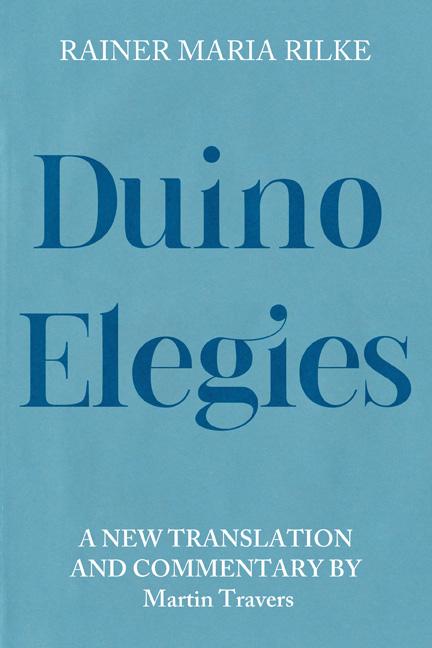Elegy 9
Published online by Cambridge University Press: 10 January 2024
Summary
We wish to grasp the world and see that grasping as an achievement, but we do this not looking for happiness. We wish to avoid what must come but, at the same, time long for it. These ambivalences define who we are. At the center of the Elegy is the imperative that we should open ourselves to the immediate presence of the world, because “being here is so much.” And we should do it now. For time is Kairos, that “just once” that knows no past and no future, but which allows us to reach a point of contact with another realm (“Bezug”), to which we bring (if we can carry it so far) “the heaviness of being.” The latter will allow us to pass through the abject state of modernity, where “more than ever / things fall apart.” Here we must learn to say and live by the simple word. We must say the simple word to the Angel and show him what we have achieved through words that belong to simple things, and we must transform them and us by taking them into “our invisible hearts.” Elegy 9 concludes with a eulogy to the earth, as if the transcendent will never be enough, and to “superabundant being,” a rare gesture of unqualified optimism in Rilke's Elegies.
Warum, wenn es angeht, also die Frist des Daseins
hinzubringen, als Lorbeer, ein wenig dunkler als alles
andere Grün, mit kleinen Wellen an jedem
Blattrand (wie eines Windes Lächeln)—: warum dann
Menschliches müssen—und, Schicksal vermeidend,
sich sehnen nach Schicksal?. . .
Oh, nicht, weil Glück ist,
dieser voreilige Vorteil eines nahen Verlusts.
Nicht aus Neugier, oder zur Übung des Herzens,
das auch im Lorbeer wäre. . . . .
Aber weil Hiersein viel ist, und weil uns scheinbar
alles das Hiesige braucht, dieses Schwindende, das
seltsam uns angeht. Uns, die Schwindendsten. Ein Mal
jedes, nur ein Mal. Ein Mal und nicht mehr. Und wir auch
ein Mal. Nie wieder. Aber dieses
ein Mal gewesen zu sein, wenn auch nur ein Mal:
irdisch gewesen zu sein, scheint nicht widerrufbar.
Information
- Type
- Chapter
- Information
- Duino ElegiesA New Translation and Commentary, pp. 249 - 272Publisher: Boydell & BrewerPrint publication year: 2023
